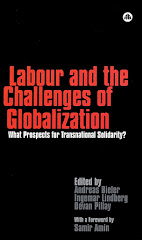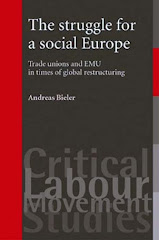In the period of 8 April to 12 May 2010, I carried out 23 interviews on the Finnish political economy with representatives of Finnish trade unions, employers’ associations, political parties and government ministries. It became clear that Finnish trade unions face significant challenges in currently uncertain and changing times.
Until 2007, the Finnish political economy was characterised by the so-called TUPO system, i.e. comprehensive tripartite incomes policy agreements between the central representatives of the employers, trade unions and government. These agreements included wage bargaining at the multi-sector level across the whole economy including the private and public sectors, but also wider work and society related issues such as job security, hours of work, maternity and paternity leave, unemployment benefit, etc. In 2007, however, EK, the main Finnish employers’ confederation, announced its withdrawal from the TUPO system. This has not meant that tripartism at the central level has been completely abandoned. There are currently six tripartite working parties dealing with issues such as pension reform. Nevertheless, collective wage bargaining has taken place at the sectoral level since 2007. Some had thought that the global financial crisis would lead to a revival of the TUPO system, but by now it has become pretty clear to all organisations involved that the employers will not return to the old system. They had found the TUPO system as too inflexible to deal with the differences of challenges faced by individual industrial sectors and ideally would like to decentralise collective bargaining even further to the company level.
The response by Finnish trade unions has been mixed. SAK, the big blue-collar and most important trade union confederation in Finland is unhappy about the new situation. It had defined itself a lot through its leading role in centralised tripartite negotiations and now has to redefine its position. As a result of collective bargaining having been moved to the sectoral level, individual trade unions have gained importance within the confederation. Service sector trade unions such as PAM, organising blue-collar workers in the private sector, and Tehy, organising white-collar workers in the health sector, are generally supportive. They felt constrained by the old system in that it was dominated by the requirements of the Finnish export sectors. General wage increases across the whole industry were kept low in order to ensure continuing competitiveness of Finnish exports in the global economy. As a result, however, wage levels in the domestic public and private service sectors remained low and most significantly a gender pay gap between men, predominantly employed in the export sectors, and women, often employed in the services sector, developed. It was difficult if not impossible to address the gender pay gap within the TUPO system dominated by the concerns of industry. JHL too, organising blue-collar workers in the public sector, increasingly focuses on the gender pay gap and, therefore, demands higher wage increases in the public sector. The Finnish Metal Workers’ Union, affiliated to SAK, on the other hand is rather concerned. Especially the first sectoral collective wage agreements in 2007 following the collapse of the TUPO system included higher settlements in the services sector and, in the view of the union, endangered Finnish export competitiveness. The current global economic crisis has also affected Finland and here especially the export industry. As a result, wage increases in the most recent bargaining round were very low across the whole economy with about 0.5 per cent. The overall future of the wage bargaining system is, however, not fully settled yet.
Prof. Andreas Bieler
Professor of Political Economy
University of Nottingham/UK
Andreas.Bieler@nottingham.ac.uk
Personal website: http://www.nottingham.ac.uk/~ldzab
14 May 2010
The purpose of this blog is to provide analytical commentary on formal and informal labour organisations and their attempts to resist ever more brutal forms of exploitation in today’s neo-liberal, global capitalism.
Search This Blog
About Me

- Andreas Bieler
- Andreas Bieler is Professor of Political Economy at the University of Nottingham/UK. (@Andreas_Bieler)










